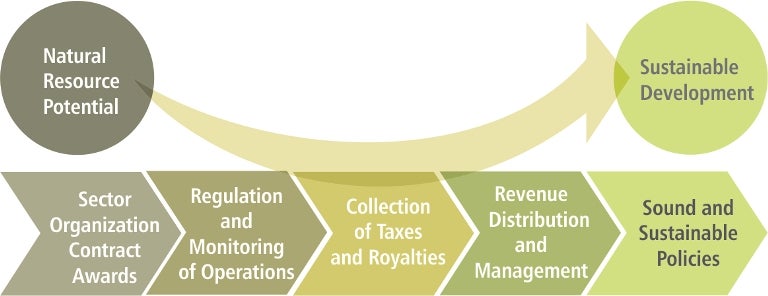More than 1.5 billion people live in countries plagued by violence and conflict. Many of their economies depend on extractive industries.
Effective and inclusive natural resources management can contribute to peacebuilding through economic growth, sustainable livelihoods, and shared benefits.
Download IEG Insight: Natural Resources in Fragile and Conflict-Affected States
Download Full Report: World Bank Group Assistance to Low-Income Fragile and Conflict-Affected States: An Independent Evaluation
How These Insights Can Help You
This brief on ways to support fragile and conflict-affected states (FCS) in managing natural resources is based on a report by the Independent Evaluation Group (IEG) entitled, World Bank Group Assistance to Low-Income Fragile and Conflict-Affected States: An Independent Evaluation. For an in-depth assessment of strategies and assistance programs in FCS countries, the evaluation draws on empirical evidence from country program evaluations of Afghanistan, Liberia, and Timor-Leste and case studies of Cameroon, Democratic Republic of Congo, Nepal, Sierra Leone, Solomon Islands, and the Republic of Yemen.
Background
High-value extractives, such as oil, diamonds, and copper, can drive economic growth and opportunities for people in fragile and post-conflict countries. When conflict ends, governments needing critical foreign exchange may turn to the revenue potential of the extractive sector to restore and maintain state functions.
Prior to restarting operations, governments can enhance effectiveness and sustainability by analyzing the institutional and political economy issues in a post-war economy and developing a strategy to address drivers of fragility with important linkages to state- and peace-building activities. This step is critical when the control of extractives fuels conflicts and undermines peace-building efforts. Protracted conflict depletes the capacity of the state to manage resources and establish institutions that can negotiate contracts and manage benefits.
Governments and their donor partners can work together to design strategies with useful risk-management measures. An evaluation by the Independent Evaluation Group of the World Bank Group Assistance to Low-Income Fragile and Conflict-Affected States (FCS) found that effective and inclusive natural resources management can contribute to peacebuilding through economic growth, sustainable livelihoods, and shared benefits. This brief extracts the evaluation's key messages and insights that can contribute to achieving these goals.
Key Takeaways
-
Analyze the relationship between high value natural resources and the sources of fragility and drivers of conflict.
-
Apply the World Bank's Extractive Industries Value Chain and sequence investments in the extractives sector.
-
Establish revenue management systems that improve the collection and administration of revenues.
-
Invest in multi-modal infrastructure and telecommunications to spur local economic growth, entrepreneurship, and service delivery.
-
Create a strategy to maximize the spillover effect to the local economy.
Insights
Relationship Between High Value Natural Resources and Fragility and Conflict Drivers
Analysis of the relationship between natural resources management and conflict is necessary to design appropriate strategies and programs that are able to reap the benefits of natural resources while avoiding conflict risks. Conflict dynamics differ even though FCS economies tend to share common features such as relatively slow growth rates, unemployment, social fragmentation, and weak institutional capacities.
Natural Resource Value Chain
The key stages of the World Bank's Extractive Industries Value Chain can be applied to improving the way contracts are awarded in the mining, forestry, and other natural resource sectors; the processes for regulating and monitoring operations; the maintenance of transparency in operations; and the collection and management of revenues. Steps along the value chain lead to the creation and enforcement of policies that promote sustainable management. The value chain process also provides a framework for the sequencing of interventions required for strategic planning in the FCS context.

Revenue Management Systems
The critical goal in an extractive strategy is establishing management systems that improve revenue collection and administration and are capable of smoothing expenditures. The Bank's support for Timor-Leste's Sovereign Wealth Fund offers lessons on the challenge of balancing saving with spending when poverty remains endemic.
Inclusive and Sustainable Economic Development
Two sets of related approaches can yield substantial economic benefits: investing in infrastructure and communications and maximizing the spillover effect to the local economy. Infrastructure and communications are essential for extractive industries. If well designed, they can also lead to significant benefits. The case of Afghanistan is instructive. Country-level analysis of potential benefits led to a strategy that encouraged the development of resource corridors, multimodal infrastructure, linkage industries particularly in mining supply firms, and overall management of fiscal revenues. The second set involves a strategy to maximize socioeconomic benefits to local communities. For example, local economic development can be spurred by investing directly in local companies to help them expand business.
Community Agreements and Local Benefit Sharing
Another key objective is to devise sound implementation policies around local benefit sharing provisions in mining and timber laws and regulations to support local development. Eritrea, Guinea, Lao People's Democratic Republic, Liberia, Sierra Leone, and the Republic of Yemen added community development regulations to their mining codes. Even where good policies and laws are developed, complementary institutional arrangements are required to share equitably and effectively the benefits. Experience in Nepal illustrates how arrangements with forest user groups can support inclusive growth and stability in the timber sector. Forest user groups provide an organizing platform and service delivery vehicle for remote and isolated communities, including those in areas where past insurgencies have emanated. The neutral role adopted by user groups during conflict enhances their legitimacy and, after the conflict ends, allows them to play a role in dispute resolution and informal justice efforts.
Achieving sustainable development and management of the extractive sectors is a long-term process. The mining sector has tremendous potential to act as a catalyst for sustainable growth through investments in shared infrastructure and human capital. An important focus area for fragile and conflict-affected countries is the transfer of natural resource wealth to subnational and local levels. Benefit sharing at the community level is vital for tackling grievances that often drive conflict. Building social capital within and among natural resource user groups can mitigate social risks and dampen the effects of conflict on community cohesion.
While it is important to assist state agencies in improving natural resources management, it is equally important to identify and support reformers and civil society groups that can both articulate concerns on transparency, such as through the Extractive Industries Transparency Initiative, and provide independent advice to national and subnational governments
Resources
World Bank Mining Community Development Agreements Sourcebook focuses on developing strategies for more sustainable and equitable benefits.
The Extractive Industries Transparency Initiative is a global standard to promote open and accountable management of natural resources.
The Extractive Industries Value Chain proposes sequential steps aimed at improving sector governance and maximizing development outcomes.
The Natural Resource Governance Institute offers technical advice and other services to promote accountable and effective governance.
See Also: IEG Insights: Women in Fragile and Conflict-Affected States | The Private Sector in Fragile and Conflict-Affected States



